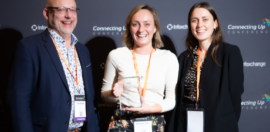A Different Type of Impact
2 December 2015 at 11:24 am
After experiencing frustration at the lack of technology tailored to the Not for Profit sector, former Foodbank Victoria CEO, Ric Benjamin, decided to tackle the issue head on, writes Ellie Cooper in this week’s Spotlight on Social Enterprise.
High-tech computer systems are essential to keep an organisation operating smoothly, but they’re often out of reach for organisations running on the smell of an oily rag. Ric Benjamin founded a social enterprise, GoodSystems Pty Ltd, to make make modern technology more accessible.
“I came up with the idea after having had the experience as CEO of Foodbank Victoria and realising how frustrating and time consuming separate systems were to running an organisation,” Benjamin said.
“And in having discussions with other CEOs in the sector it became obvious that my frustration was a common frustration, and that people were looking for a simple, easy to use system that allowed them to share information easily within an organisation.”
Benjamin said that the IT systems Not for Profits typically use were fundamentally incompatible with the unique needs of the organisations.
“The ability to look up histories is very difficult, the fundraising systems don’t link with volunteer systems, so it’s hard to know when a volunteer is also a donor. You don’t know whether your staff are volunteers or donors,” he said.
“Typically fundraising systems don’t talk to finance systems – when you change information in one it doesn’t change in the other [making it difficult] to know how your project is running, how much money you’ve spent on your grant, all of these things.
“You’re relying on other people to give you information, not because they have the exclusive responsibility of that information, but the system they use you don’t have access to because that’s not what you do day-to-day.
“[It’s] almost impossible for most small organisations who don’t have the ability to spend hundreds of thousands of dollars on big IT systems.”
While Benjamin admits that computer software is often overlooked as a priority, the right system can help organisations have greater impact.
“Everyone, rightly so, focuses on the social impact that they’re having with their clients or in the environment – the results that they’re generating with the end-user,” he said.
“But what’s being missed in that conversation is how efficient, how effective and how professionally run the organisation is.
“And there is a growing demand by governments, by trusts and foundations or by funders to have organisations be more transparent about that side of things, and for many organisations that’s going to be a real struggle.
“What GoodSystems is going to do is allow them to demonstrate that for themselves and satisfy themselves they’re being effective and efficient, but also being able to share that with other stakeholders so that both sides of the social impact story can be told equally, and equally well.”
Benjamin initially spent six months researching possible solutions, before he came to the realisation that most available options weren’t adequate because they didn’t address the needs of the sector.
“Business in general doesn’t deal with grants, business in general doesn’t look for donations, they make sales. Businesses in general don’t have volunteers, so the needs of the sector were quite specific,” he said.
“And so there was very little that was readily available and most products had to be adapted for the needs of the sector, and that’s typically done customer by customer, not the sector for a whole.
“It occurred to me that there was an opportunity to help the sector by developing something specifically for the sector that filled in all of those gaps and provided that single view that an organisation wants so they can share information and be more accountable and more transparent.”
He partnered with a UK company that created software for small businesses and worked with them to convert it to a platform for the sector.
Benjamin said the major challenge in starting his social enterprise was ensuring the product was right for the target audience.
“Starting up any business, including a social enterprise, it’s about getting the business model right, it’s about ensuring your offering is something that is needed in the market,” he said.
“So I spent a good six months in preparation looking at the market and the need in the sector for such a product, so it’s about getting the homework done right.
“Then from there we worked with The Difference Incubator, out of the Donkey Wheel Foundation, to mature the model and explore the critical areas… to make sure that we’ve got the business model right, we’ve got our planning right, and all of those things.”
He formed a reference group, which ran from the end of 2014 until September this year, of potential customers from administration, human resources, finance and other roles who rely on IT systems.
“I think for us, as a software company, the critical thing was having that engagement with the sector, having that reference group meant that we were working hand-in-hand, in parallel with the sector,” he said.
“As they expressed their needs and their concerns we were able to adapt to those issues so we knew that we had a product that the market wanted as soon as we were ready to release it.”
GoodSystems went live at the end of November with its first client, Good Shepherd Australia and New Zealand, who were also part of the reference group.
Having just launched, Benjamin said financial sustainability is still something the enterprise is working towards.
“We are at a start-up phase, but we certainly believe were not too far away from being well on the way to being financially stable,” he said.
“In fact we’ll be looking for a new round of investment as a social enterprise in 2016, and we’ll be working with Benefit Capital to look to secure additional funds for impact investors.”
But he said that keeping the system cost-effective is a priority, and in the future he will look towards increasing GoodSystem’s impact through offering free software to small organisations.
“Our experience is that the costs are definitely pitched at the right level… also when you start removing the other applications that people would have used instead of GoodSystems the cost is definitely in the positive. Good Shepherd has indicated that they believe that they’ll be saving money,” he said.
“As a social enterprise, we believe that we’re helping organisations with an across-the-sector solution to demonstrate their own social impact, but beyond that we also recognise that at the moment small organisations are penalised because they’re a start-up, just like we are, or were,” he said.
“You don’t necessarily have access to all of the things that help you be as professional… from the beginning.
“So we want to provide that platform to organisations. That’s a little while away yet, we’ve got to become sustainable in our own right before we can start doing that, but that’s certainly very much part of the philosophy of the company.”
GoodSystems is a could-based platform that offers fundraising, finance and accounting, human resources and project management.







